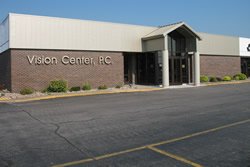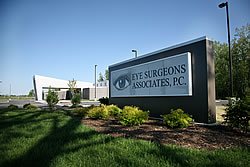LASIK Eye Surgery in the Quad Cities
LASIK is a life changing procedure and the skilled LASIK surgery team at Eye Surgeons Associates can help you eliminate or reduce your need for glasses or contacts and correct your astigmatism, near or farsightedness.
Since LASIK eye surgery was first approved by the FDA in 1999, more than 20 million LASIK procedures have been performed in the U.S. LASIK is among the most studied elective procedures and has one of the highest patient satisfaction rates of any elective procedure.
Get started on your journey to new vision:
- Learn about advanced laser vision correction procedures:
- Review our LASIK pages and videos
- Talk to our LASIK Coordinator 563-323-9999
- Find out if you’re a candidate:
LASIK Eye Surgery Procedure
Prior to treatment, medication will be provided to help relax you. The surgeon applies anesthetic eye drops to numb the eye. An eyelid support will be used to help avoid blinking. Using a femtosecond laser, the surgeon creates a flap and lifts a thin layer of corneal tissue. The cornea is gently reshaped by an Excimer laser using a “cool” laser beam allowing light to focus correctly on the retina letting you see more clearly. The corneal flap is smoothed back into place and serves as a natural bandage expediting the healing process.
This in office procedure is typically completed in about 15 minutes, however you should plan to spend 1 ½ to 2 hours in the office for pre and post-surgery prep time. Most LASIK patients notice improved vision immediately, but you will need someone to drive you home. Avoid touching or rubbing your eyes and getting water in your eyes. You’ll be given a very “fashionable” pair of goggles to go home in to help prevent this from happening. Typically patients are able to return to work the next day and resume most of their normal activities. Remember to use the medication prescribed by the doctor.
Am I A LASIK Candidate?
The best way to find out if you are a good candidate for LASIK is to schedule a free consultation. You should also meet these qualifications:
- At least 18 years of age
- Healthy eyes (especially your corneas)
- Stable glasses prescription
- Dissatisfaction with contacts or glasses
- Realistic expectations about the procedure
- At least 3 months out from pregnancy or nursing
- Contraindicated for patients taking Accutane or Amiodarone, patients who have uncontrolled autoimmune disease, severe dry eye or have been diagnosed with Keratoconus
Take our LASIK self-test.
Please call 563-323-9999 or email [email protected]* with questions or schedule your free consultation online.
RISKS
LASIK is a surgical procedure conducted on the corneal part of the eye, and it is crucial that patients are well educated on the potential benefits and risks of this procedure. As with any type of surgery, risks are involved. After your pre-operative evaluation, you will have a good idea about the risks and what they mean to your specific situation.
It is important to discuss any concern with your surgeon and weigh the risks and potential benefits. Each patient’s vision is different and several treatment options are available in order to give the best possible results. A patient information booklet is available with a complete listing of the indications, contraindications, complications, precautions and side effects.
This surgery is not suitable for all patients, individual results may vary and are not guaranteed.
IMPORTANT PRODUCT INFORMATION
WaveLight® Excimer Laser Systems
CAUTION: Federal (U.S.) law restricts the WaveLight® Excimer Laser Systems to sale by or on the order of a physician.
What if I am Not a LASIK Candidate?
For some patients, there are instances where LASIK may not be a good choice. Fortunately, there are other options available: PRK, ICL, and RLE.
PRK Surgery
PRK is quite similar to LASIK. Photorefractive keratectomy (PRK) is a procedure in which the surface of the cornea is reshaped by the surgeon using the Excimer laser. The main difference between PRK and LASIK is that with PRK there is no corneal flap created, instead, the laser beam is applied directly to the surface of the eye to reshape the cornea. PRK is less frequently used because of the development of LASIK, but for patients with thin corneas or other corneal irregularities, PRK may still be the procedure of choice.
Even though the initial healing may take several days longer than that of LASIK, the long-term results are the same. In general, PRK patients will have a somewhat slower recovery of their best vision than LASIK patients. Studies at the 6-month postoperative visit in LASIK and PRK patients show essentially equivalent results with similar ranges of nearsightedness.
“Professional, thorough, and informative for my PRK procedure! The team was quick and efficient, but kind and helpful. The procedure was as comfortable as an eye procedure could be, and any bumps I’ve encountered along the way have been addressed quickly! Sarah, the lasik nurse, has been especially helpful. I’m very pleased so far and would recommend them to anyone! I went from -5.75 to able to drive without glasses in a week! Wild!”
Kathryn, Illinois
EVO ICL Surgery
EVO ICL surgery is an excellent alternative to LASIK and PRK. It is especially useful for patients with high nearsightedness as it can safely and effectively treat larger prescriptions. Unlike LASIK or PRK, EVO ICL surgery involves placing a small, thin, biocompatible lens inside your eye behind the iris and in front of the natural crystalline lens. The EVO ICL lenses come in different sizes and strengths and will be customized based on your pre-operative measurements to provide excellent vision.
EVO ICL is a straightforward procedure and is performed in our outpatient surgery center. It usually takes less than one hour to complete. Before the procedure we will administer a systemic relaxing medication as well as a local anesthetic to ensure you are comfortable throughout the surgery. During the procedure, the surgeon makes a small incision in your cornea and then places the EVO ICL lens inside your eye. The surgeon will then ensure it is properly positioned and secure.
Most patients notice improved vision immediately and it continues to sharpen over the coming days. We recommend avoiding strenuous activity for the 1st week. We will carefully monitor healing at follow up appointments.
Refractive Lens Exchange
Refractive Lens Exchange (RLE) also known as clear lens extraction (CLE) is gaining popularity as an option for people over 40 who want to decrease or eliminate their dependence on glasses or contacts and who are not good LASIK candidates. Like LASIK, this is an elective procedure.
The aging process causes several issues for the clarity of your vision. When we are young our natural lenses are very soft and elastic. As we age this lens loses elasticity making seeing more difficult. Some people over the age of 40 will begin to experience hyperopia or farsightedness and maybe presbyopia and require bifocal glasses to see anything.
What is Refractive Lens Exchange?
Refractive Lens Exchange is a corrective procedure where the natural lens of the eye is removed and replaced with an artificial lens, similar to cataract surgery. This procedure is best for patients who are over the age of 40 with farsightedness.
You may be a candidate for a multifocal IOL if you:
- Are not a good LASIK candidate
- Desire to reduce or eliminate your need for glasses
- Are over the age of 40, farsighted, and need glasses
- Are over the age of 60 and starting to develop cataracts
If you are interested in this procedure, please contact our Refractive Surgery Coordinator for more information at 563-323-9999 or [email protected]*. This is surgery and risks exist. Your doctor and their team will counsel you regarding risks specific to your eye and your general health.
LASIK Eye Surgery Questions
A. LASIK has proven overwhelmingly successful in reducing dependence on glasses and contact lenses. Clinical studies show that most LASIK patients (with mild to moderate prescriptions) have the potential to achieve 20/20
vision or near 20/20 vision. Generally, this means they no longer need or have reduced their dependence on glasses or contacts to drive, play sports, watch movies and TV, or participate in careers requiring excellent vision.
A. Some potential complications include conditions such as dryness, night glare, under or over-correction, corneal flap complications, infection and loss of best-corrected vision. The risks of surgery should be discussed fully with the doctor prior to the procedure. Additionally, proper post-operative care helps to identify and address any potential healing complications.
A. There is almost no pain involved with LASIK, but many patients find the procedure to be slightly uncomfortable. Anesthetic drops are used to numb the eye just before surgery begins and typically patients may be given a mild sedative to relax. After the procedure, the eye may feel a foreign body sensation or slight irritation for a few hours, like a grain of sand in your eye, but most patients are very comfortable shortly thereafter.
A. Most LASIK patients usually see quite well the day following their procedure and may be able to resume most of their normal daily activities. Although the speed of visual recovery depends on personal healing patterns, most patients notice dramatic visual results within the first few days following their procedure.
A. The difference between the two is in how the flap is cut prior to the reshaping of the cornea. Bladeless LASIK uses a laser to create the flap in the cornea rather than a blade. While LASIK had been performed successfully for many years with the Microkeratome blade, the Wavelight femtosecond laser offers the surgeon more control, better flap alignment, and reduced flap complications compared to Microkeratome Lasik.
A. A. LASIK sculpts the cornea, the front part of the eye. The cornea doesn’t change much over the years, although there is a less than 5% chance you will need an enhancement/touch up. LASIK, however, does not stop the natural/biological changes as we age from occurring, like cataracts or presbyopia. These changes will happen with or without LASIK and you may once again need some glasses correction to see your best.




